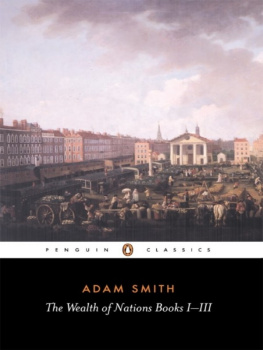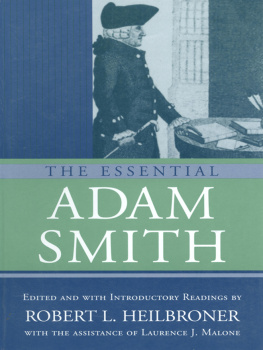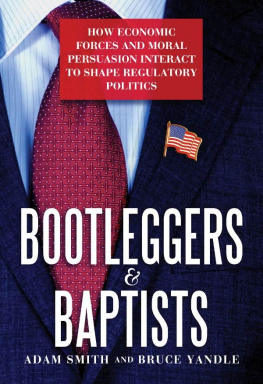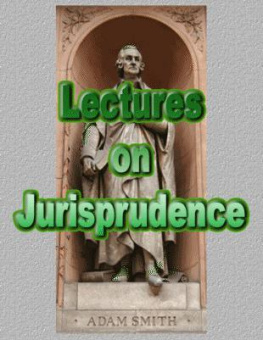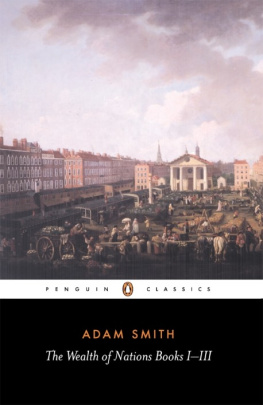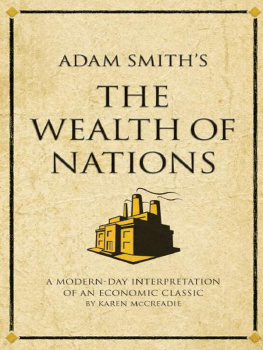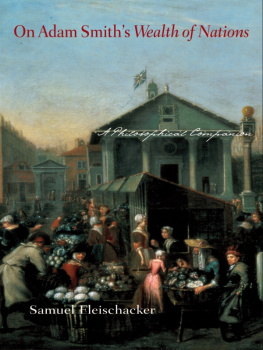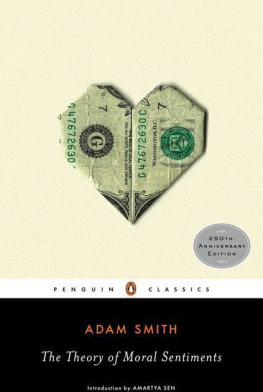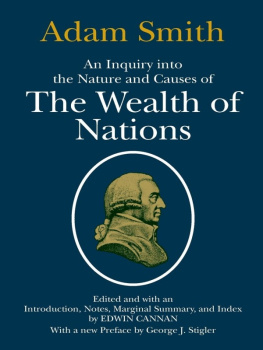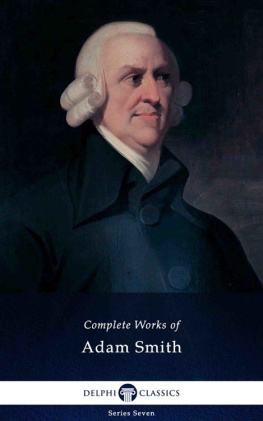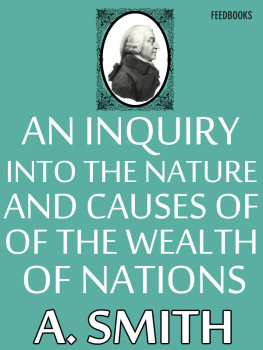THE WEALTH OF NATIONS
ADAM SMITH was born at Kirkcaldy, on the east coast of Scotland, in 1723. He was educated at his local school, then Glasgow University (173740), where he studied under Francis Hutcheson, and Balliol College, Oxford (174046). Two years after his return to Scotland, Smith moved to Edinburgh, where he delivered lectures on Rhetoric which did much to establish his early reputation. In 1751 he was appointed Professor of Logic at Glasgow, but was translated to Hutchesons old chair of moral philosophy in 1752. He held this appointment until 1764, during which tenure he published, in 1759, The Theory of Moral Sentiments. In 1764 Smith resigned his professorship to become tutor to the young Duke of Buccleuch. This office took him to France, where he travelled extensively, and met many of the leading thinkers of the day, among them Voltaire, Quesnay, Turgot and Helvetius. Smith continued to write The Wealth of Nations in France and furthered his research after his return to Britain in 1766. The book was published in 1776, the same year as the American Declaration of Independence. In 1778 Smith was appointed as Commissioner of Customs based in Edinburgh and was a resident of the city until his death in 1790. He was elected Lord Rector of Glasgow University in 1787, succeeding his friend Edmund Burke. Smiths life was relatively uneventful, and his disposition absent-minded and retiring, yet he wrote with vigour and did not lack courage; a fact attested to by his defence of the character of the alleged atheist David Hume after the latters death.
ANDREW S. SKINNER graduated from Glasgow University in 1958. After short periods in Cornell (19589), Queens University Belfast (195962) and Queens College (now University) Dundee (19624), he returned to Glasgow University in 1964 where he now holds the post of Adam Smith Professor of Political Economy, Emeritus. Professor Skinner has written numerous articles on eighteenth-century subjects and edited Sir James Steuarts Principles of Political Economy (1966). He has also contributed to editions of Smiths Wealth of Nations (1976) and to the Essays on Philosophical Subjects (1980). He has edited (with R. H. Campbell) The Origins and Nature of the Scottish Enlightenment (1982) and (with P. Jones) Adam Smith Reviewed (1992). Professor Skinner is also the author of A System of Social Science, Papers Relating to Adam Smith (1979; 2nd edition 1996). He has re-edited Sir James Steuarts Principles of Political Economy (with Professors N. Kobayashi and H. Mizuta, 1998).
ADAM SMITH
The Wealth of Nations
BOOKS IIII
Edited with an introduction and notes by
ANDREW SKINNER
PENGUIN BOOKS
PENGUIN BOOKS
Published by the Penguin Group
Penguin Books Ltd, 27 Wrights Lane, London W8 5TZ, England
Penguin Putnam Inc., 375 Hudson Street, New York, New York 10014, USA
Penguin Books Australia Ltd, Ringwood, Victoria, Australia
Penguin Books Canada Ltd, 10 Alcorn Avenue, Toronto, Ontario, Canada M4V 3B2
Penguin Books (NZ) Ltd, Private Bag 102902, NSMC, Auckland, New Zealand
Penguin Books Ltd, Registered Offices: Harmondsworth, Middlesex, England
First published 1776
Published in Pelican Books 1970
Reprinted with revisions 1974
Reprinted with revisions 1979
Reprinted in the Penguin English Library 1982
Reprinted in Penguin Classics 1986
Reprinted with a revised introduction and minor text corrections 1997
Reprinted with chronology and new index 1999
1 3 5 7 9 10 8 6 4 2
Introduction copyright Andrew Skinner, 1970, 1974, 1979, 1997, 1999
All rights reserved
Except in the United States of America, this book is sold subject
to the condition that it shall not, by way of trade or otherwise, be lent,
re-sold, hired out, or otherwise circulated without the publishers
prior consent in any form of binding or cover other than that in
which it is published and without a similar condition including this
condition being imposed on the subsequent purchaser
EISBN: 9780141908199
CONTENTS
PREFACE
The present edition of what is now volume I of The Wealth of Nations was first published in 1970, with revisions introduced in 1974 and 1979. Originally the constraints of space dictated that Books IIII only were included in the Penguin edition (1970), but in the hope, now realized, that Books IV and V would be published in a separate volume. The decision to complete the edition provided me with an opportunity to prepare an additional introduction which comments on Smiths treatment of physiocracy, mercantilism and his views on the role of the state.
The version of Books IIII here reprinted follows the text of the fifth edition although the spelling and punctuation have been modernized. The introduction is not significantly different in shape, although the opportunity has been taken to move reference to the text and to simplify the footnotes.
There are no substantial changes to sections 1 and 2. Section 3 has been modified in order to elaborate, inter alia, on the psychological assumptions of The Theory of Moral Sentiments and the theory of growth. This version follows the argument of chapter 7 of my System of Social Science (1996) and appears with the permission of Oxford University Press.
The conclusion has been rewritten partly with a view to take account of recent critical literature.
I owe immense debts to Professor Thomas Wilson, to the late A. L. Macfie and to Lord Robbins. My wife has borne with my various struggles over many years with enormous patience, for which I remain deeply grateful.
Andrew S. Skinner
Glasgow, August 1999
ADAM SMITH
KEY DATES, AND SOME CONTEMPORARY PUBLICATIONS
1723 | Born Kirkcaldy, Scotland, and baptized on 5 June: the son of Adam Smith, Clerk of the Court Martial and Comptroller of Customs, and of Margaret Douglas of Strathendry. |
1731 | Entered the Burgh School, Kirkcaldy. |
17357 | George, Bishop Berkeley, The Querist. |
173740 | Attended the University of Glasgow. |
174046 | Snell Exhibitioner, Balliol College, Oxford. |
1748 | Baron de Montesquieu, De lsprit des lois. |
174851 | Delivered a course of lectures in the city of Edinburgh. |
1749 | Josiah Tucker, A Brief Essay on the Advantages and Disadvantages which respectively attend France and Great Britain with regard to Trade. |
1751 | Elected to the Chair of Logic at Glasgow University. |
1752 | Translated to the Chair of Moral Philosophy at Glasgow University. |
| David Hume, Political Discourses. |
1754 | Franois Forbonnais, lments du commerce. |
1755 | Richard Cantillon, Essai sur la nature du commerce en gnrale. |
1757 | Victor Riquetti, Marquis de Mirabeau, LAmi des hommes, ou trait de la population. |
1758 | Franois Quesnay, Tableau conomique. |
1759 | First edition of The Theory of Moral Sentiments. |
1760 | Joshua Gee, The Trade and Navigation of Great Britain Considered |

